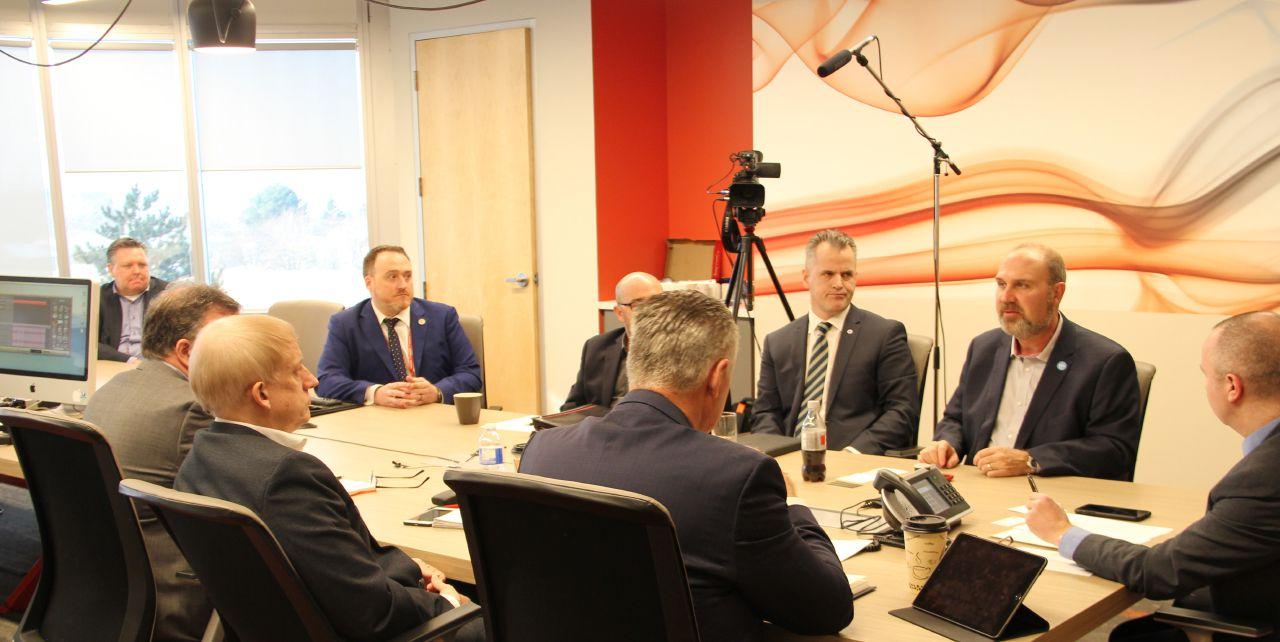SECURING CANNABIS

A guide to the technologies and trends shaping the market






A guide to the technologies and trends shaping the market




Your business is dynamic and constantly changing. We get that. At G4S we also understand that our customers are unique, particularly in the Cannabis industry. You might be a micro-grow operation starting a security program, or maybe you see the need for a customer service-centric program to serve as an extension of your brand in a retail environment. You could be somewhere in between. The key is G4S has the tools and know-how to help you succeed, whatever part of the journey you’re at.
It might be easy to view security as a basic component in achieving Health Canada compliance, or a necessary piece in launching your business. Some get stuck and overlook the role it plays in the future development of their operation and fail to realize the long-term value it can deliver. Setting up a robust security program from the start is important but it doesn’t have to be expensive. At G4S we work with you to understand your business goals and design a security program around what you value most. For some, that might be an emphasis on training, such as CannSell licensing. You might value discretion and are concerned with information leakage, requiring all your guests and visitors to sign in via an auditable visitor management system. More often than not, discussions we have with our customers surface new threats or potential solutions they were unaware of to begin with.
development of these factors is also considered and we work to devise a continuous risk management strategy to help define the total cost of ownership for your security programs. We always review the fundamentals, such as basic policies and protocols. This is one of the easiest and most budget-friendly ways to ensure your program is off to a good start.
If you already have security services in place, we start by analyzing your physical security program and describing creative, pragmatic and responsible efficiencies. We review the delivery of your current services, costs, requirements, value to your business and recommend how to optimize your programmaximizing value without negatively impacting your security risk profile. The data we collect enables us to discuss program adjustments - finding a medium between human and technology resources to balance risk and cost, eliminating waste and achieving efficiency.
“At G4S we work with you to understand your business goals and design a security program around what you value most.”
Retailers and producers from across Canada have trusted G4S with securing their product and facilities. We evolve with you, adapting the capacity of your security program to align with the demands of your business. We are your physical security experts and a one-stop shop when it comes to security. Our aim is to be a trusted advisor that is serious about your success and delivering programs of value.
We start every conversation with understanding your resources, the risks you are facing and the potential resolutions available. The future
Contact us to discover the power of a partnership with the world’s leading security solutions company and make us a part of your growth plans.

When you are looking to protect that which is most important to youyour people, property and assetsexperience matters. Our clients around the world have trusted us with their security programs since 1901, and we never take that trust for granted.
Today, with more than 10,000 security professionals across Canada, G4S creates a collaborative environment in which to create a security program that addresses the challenges of your business. Each recommendation is driven by your unique risk assessment.
Let’s take that first step to providing peace-of-mind.
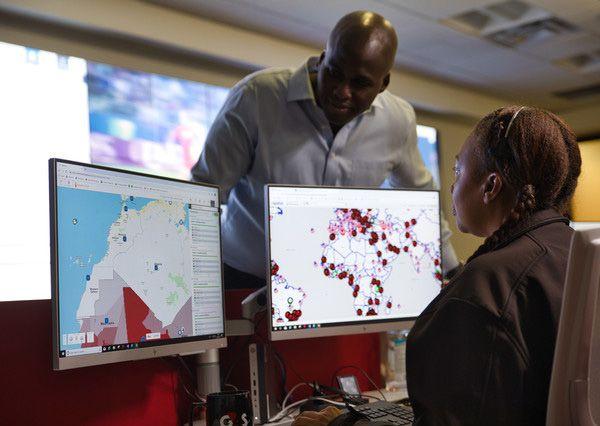



PEOPLE: Powerful human connections. Reliable, professional and trusted.
PROCESS: With something so important, the details matter the most. We get it.
TECHNOLOGY: We provide 24/7 peace-of-mind solutions.
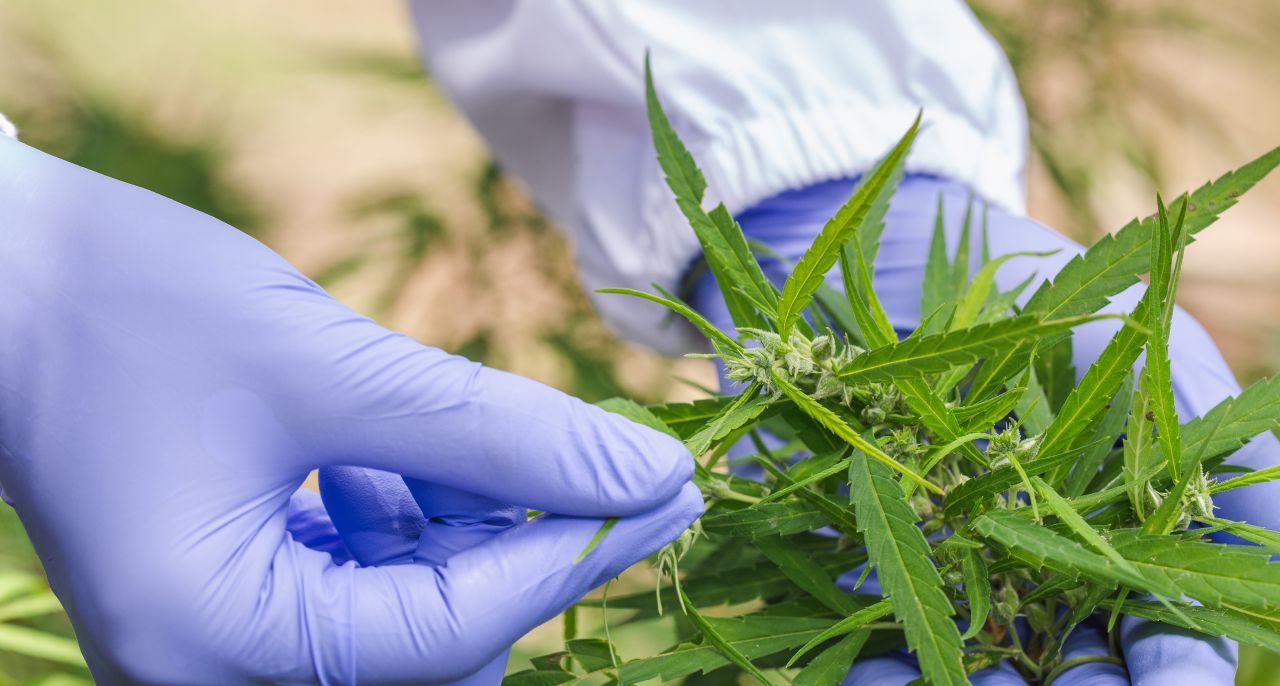
Security experts suggest stringent health and safety protocols helped cannabis businesses manage COVID-19 better than most
By Alanna Fairey
While the world at large has been shaken up and turned upside down in recent months, the cannabis industry has experienced a limited amount of change and has continued to do business.
Jeff Hannah, founder and principal consultant of JH & Associates, notes that the COVID-19 pandemic has not significantly affected the cannabis industry, explaining that the pharmaceutical standard that the industry abides by was significant in terms of managing the health and safety precautions brought on by the pandemic.
“A lot of the existing [cannabis] businesses had to make the same changes that a lot of businesses made, but really if you know anything about those places
they’re probably the safest workplaces you could be in right now,” Hannah says.
“Everyone is gowned up, you have masks on, everyone has got gloves on and there is constant hand washing.”
Hannah also shares that given the nature of the projects he was working on as the pandemic hit, he has not seen many projects moved to the back burner.
“A lot of my projects have to do with ones that are under construction and in most provinces they were able to sort of fit into that essential business category,” Hannah explains.
“For the most part, these projects kept on rolling, and I was very lucky that a lot of my projects weren’t really affected by COVID.”
Mike Soberal, senior director of corporate security at Calgary-based Aurora Cannabis also shares that many
of the company’s security programs have remained unchanged since the pandemic.
However, he notes that the company has implemented additional safety precautions.
“We have looked to national public health guidelines to inform security enhancements since the onset of the pandemic,” Soberal says. “Prioritizing the safety of our employees, we have altered our visitor and entry program by introducing new screening measures, including well-being and travel history questionnaires and temperature taking.”
Aurora has also implemented physical distancing protocols across all of their operations and have provided production staff with additional personal protective equipment (PPE), which he says exceeds the requirements of the Cannabis Act, a legal and regulatory
framework for controlling the production, distribution, sale and possession of cannabis in Canada.
As the COVID-19 situation continues to change, Soberal adds that Aurora will adjust their security measures as they see fit.
“As we look ahead, we are actively examining longer-term strategies for use at our facilities and will work to adapt to the evolving global understanding of a new normal,” Soberal states.
While COVID-19 has inspired a plethora of other restrictions and changes in the lives of Canadians, the cannabis industry has actually eased up on some of the regulations that were established when it was first getting underway in 2018.
“If anything, security in cannabis is becoming more relaxed. Initially it started out very strictly regulated,” says Hannah. “Things are getting a little bit easier as we learn more about what Health Canada expects as a regulator.”
Daniel Bear, a drugs policy researcher and professor on the Criminal Justice degree program at Toronto-based Humber College, shares that the production side of the cannabis industry has also become less restrictive in terms of security.
Health Canada previously announced that they will continue reviewing applications for new cannabis licences and security-clearance applications during the COVID-19 pandemic, though there may be delays.
Bear explains that Health Canada announced that if there were not enough staff who have security clearances because of either health-related issues or work from home requirements, cannabis producers can designate a non-security cleared person to take on roles that would normally require security clearance.
This is an interesting development, according to Bear, as these regulations have the potential to become a regular practice amongst cannabis producers once the pandemic subsides.
“Obviously, you cannot say that cannabis has no regulation and we are just going to let it do whatever it wants,”
Bear stresses. “Time is potentially saying that perhaps we do not need to be as strict with these regulations. We can better deploy Health Canada oversight resources and companies can better utilize staff and production techniques.”
As the COVID-19 situation develops, it remains to be seen whether or not these less strict regulations surrounding cannabis production will be the new normal.
“We’re coming up with interpretations that are more practical and realistic, and then Health Canada can understand and endorse,” Hannah says. It will all depend on whether businesses are able to safely grow and move their products from seed to sale, without all this heavy security clearance, says Bear.
“We have an opportunity to rethink how we regulate drugs and alcohol, and we have the opportunity to start and try something new,” Bear concludes.
The new normal Navigating the new normal and adjusting to the changing climate has proved to be a challenge, but Soberal commends Aurora Cannabis’ staff for coming together during this time and
continuing to get their cannabis products to customers across Canada.
Committed to operating in full compliance with the regulations in the Cannabis Act, Aurora has continued to abide by the government’s policies.
Soberal shares that at the beginning of the pandemic, Aurora was proactive in their response to the virus.
“Aurora immediately began assembling a response committee across functional teams to ensure swift and coordinated changes that have ensured we have been able to remain fully operational,” Soberal says. “We’re looking carefully at the future and continuing to assess new projects and opportunities to further strengthen our security strategies.”
Soberal explains that Aurora responded to the pandemic by increasing their PPE stockpiles and working with vendors to ensure that their supply chain remains uninterrupted and can continue to service their customers.
“I’m proud of how the Aurora team has worked together to make decisive pivots to adapt to COVID-19 and keep our staff safe,” Soberal says. “I am encouraged by how resilient our company and our workforce is, and know that we will keep working together to have a bright future.”
While cannabis producers have undergone changes during COVID-19, the retail sector has also seen changes to regulation.
Back in April, Premier Doug Ford and the Ontario government announced that legal cannabis retailers in the province were granted permission to provide curbside pickup and delivery options — options that were not approved prior to the pandemic.
According to the government’s statement, no more than 30 grams of dried cannabis can be delivered or picked up. In addition, retailers are still required to check ID to ensure the person purchasing the product is of age.
Also, those handling delivery or curbside pickup must have completed the same training required for staff working in cannabis retail stores.
Daniel Bear, a drugs policy researcher and professor at Humber College in Toronto, says that deeming legal cannabis businesses as essential throughout Canada, has in turn resulted in the government having to rethink the heavy handed and limiting regulations around cannabis retail.
“It is going to be an interesting experiment to see if we really did need the very strict measures around cannabis retail that were initially put into place,” says Bear.





Like many other facilities that handle sensitive products, cannabis security requirements are very complex.
THE BULLDOG FIRE & SECURITY team has an in depth understanding of:
• Cannabis Production Security and Clearances
• Health Canada’s Cannabis Act
BULLDOG FIRE & SECURITY has worked with many facilities and has years of experience in this field. We utilize a variety of solutions and services in order to build customized solutions that are compliant with Health Canada regulations.
We offer a variety of solutions and services including:
•Access Control
•IP Video
•Integrated Security Systems & Fence Perimeter Intrusion
•ULC Listed Monitoring
•Skilled and Knowledgeable Technical Team
•Data Comm & Structured Cabling



The recent legalization and regulating of cannabis in Canada has caused an explosion of activity in the industry in just a short time. Over the past year, we have seen the number of production facilities increase dramatically, as well as their security needs, now to include the needs of legal dispensaries as well. The evolution of the legalized cannabis industry has resulted in a scramble to educate cannabis facility operators on their security needs as stipulated by Health Canada guidelines.
BULLDOG FIRE AND SECURITY has a wealth of knowledge and experience in this industry, working with numerous facilities to ensure they are compliant with Health Canada, while also addressing their other security needs. Our team has an in depth understanding of:
• Cannabis Production Security and Clearances
• Health Canada’s Cannabis Act
Services & Solutions for Cannabis Facilities
BULLDOG FIRE AND SECURITY will work with your consultant, as well as your construction and operations teams to develop a system that will ensure that your facility is secure. A comprehensive system may include elements such as security gates, access control, security cameras, and an intrusion alarm system.
ACCESS CONTROL – Cannabis regulations indicate that access to areas where cannabis is grown, stored, or handled must be restricted to staff who are required to work in those areas. Access Control Systems can be utilized with both interior and exterior doors, and are scalable so that they can change as your business grows.
Security Cameras – The perimeter of your facility as well as all areas where cannabis is produced, stored or handled must be monitored at all times. A networked security camera system throughout the interior and exterior of your building is a requirement in order to satisfy the requirements by capturing and recording data 24/7 to protect your staff, products, and building.

ULC Listed Monitoring – A ULC Listed Monitoring Station acts as a set of eyes to provide your building with 24-hour coverage that will alert you and the appropriate emergency responders of any alarms or emergencies.
Integrated Security Solutions – An integrated security solution brings together all of the elements of access control, security cameras, and intrusion systems in a collaborative way to maximize the capabilities of your system. Through integration, you can receive video clips, notifications, and user insights.
Data Comm & Structured Cabling – Complete end-to-end certified Networking solutions for your IT structured cabling needs for computer terminals, scales, and wireless access points ensures that your operations not only function smoothly, but are also secure from possible compromise.
Each project we undertake begins with a full review of your site and operations in conjunction with your consultants and contractors so that we can design the perfect solution for you. This collaborative effort is part of our dedication to working with you every step of the way to ensure that your facility is compliant so that you can get your business up and running quickly. This collaboration will include: • Threat Risk Assessment
• Security Site Plan • Security Floor Plans • Separate Secure Storage Security Plan
• Description of Security Plan • Detailed Security Standard Operating Procedures (SOP)
• Resume of Suitable Quality Assurance • Security Background Checks
LEARN MORE - BULLDOG FIRE AND SECURITY has the expertise to navigate the complex needs of your cannabis production operations. We pride ourselves on using innovative, cutting edge technology to build customized solutions for our customer’s unique businesses.
To schedule a no obligation assessment of your facility’s needs, call us at 1 866 670 1590, or email info@bulldogsecurity.ca.

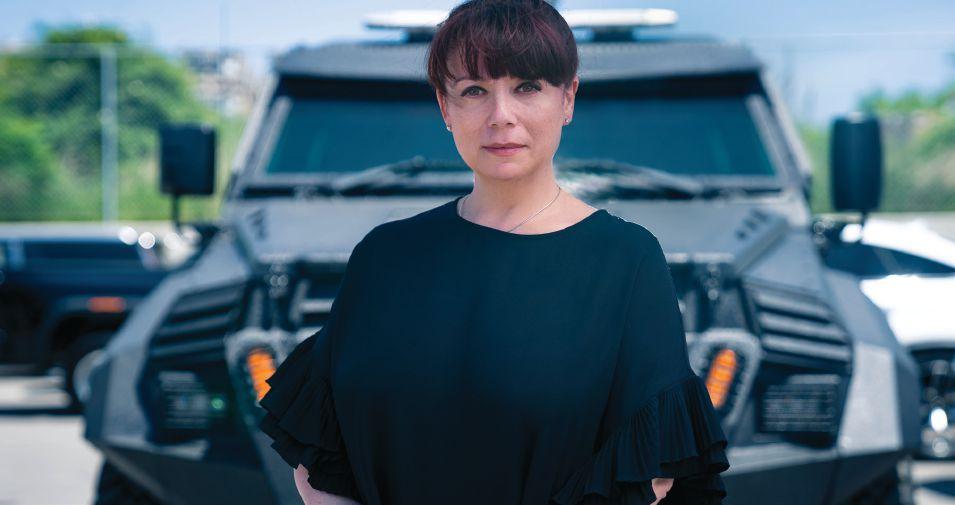
The recent decriminalization of cannabis in some markets and legalization in others has presented a game-changing opportunity for businesses who were ready to embrace the demands of the new industry. But it was not only the growers and cultivators who have found ways to benefit – it was savvy businesses who were able to adapt their products and services to the emerging market.
expertise would transfer well to the cannabis industry.”
As with any industry, cannabis presents its own unique challenges as it is a sensitive and highly perishable product that can be easily damaged during transportation. Cannabis requires moisture, temperature, and ventilation in order to maintain the quality of the product and prolong its shelf life.
“IT IS IMPORTANT FOR BUSINESSES TO CONSTANTLY EVOLVE WITH THE TIMES”
-MARGARITA
SIMKIN
One such company was Toronto-based INKAS® Armored Vehicle Manufacturing – a global leader in its field, renowned for manufacturing high-security bulletproof vehicles that protect both valuable assets and human lives. Chairwoman Margarita Simkin immediately identified the opportunity to provide the industry with specialty vehicles in order to ensure the secure transportation of the controlled substance while on route to dispensaries. INKAS® expertise in secure vehicles gave the company a competitive advantage and an opportunity to be first-to-market.
“It is important for businesses to constantly evolve with the times,” said Ms. Simkin. “One of INKAS® niches is the manufacturing of Cash-In-Transit vehicles for the secure transportation of cash and valuables such as jewelry, diamonds, and precious metals. We knew that this
Under the guidance of Ms. Simkin, INKAS® engineers embraced this challenge by leveraging their extensive experience in designing special purpose vehicles for extreme climates worldwide where interior climate control is critical to missions. The company’s existing technologies, as well as its manufacturing capabilities, made it a natural fit to transition into the industry by refitting its standard Cash-In-Transit vehicles and equipping them with air conditioning and climate control features that are ideal for cannabis.
Margarita Simkin is no stranger to highly regulated industries and navigating the nuances of transporting high-value items. For over 20 years, Ms. Simkin has played an integral part in building various security and risk management businesses from scratch, in industries which have been notoriously challenging for women within leadership roles. She has had a leading part
in the company’s growth as the company has evolved over the years from a singletruck armored courier business, into a fullservice, end-to-end security company.
INKAS® had began its operations providing Cash-In-Transit services through its INKAS® Security Services division, and by 2019, Ms. Simkin had grown the division into the third largest Cash-In-Transit operator in Canada – providing services to government organizations, businesses, merchants and financial institutions. Margarita Simkin led the division INKAS® Security Services Ltd. and served as the Chairwoman until its acquisition in early 2019 by a major player in the cannabis industry. Her strategic decision to ultimately sell the division, gave the company the ability to further grow its offerings.
Today, INKAS ® Armored Vehicle Manufacturing continues to supply secure cannabis trucks to several of the largest cannabis players in both the United States and Canada, demonstrating that success in the cannabis industry does not come only from growing and selling cannabis. There is a full supply chain with satellite industries that have been born out of the legalization of cannabis, with many opportunities for companies to repurpose their products and services in order to carve out their own niche. INKAS® is an example of a business that has flourished as a result of entering the cannabis industry, and is proof that it doesn’t take a complete reinvention of your company or products to find new ways to expand your business.
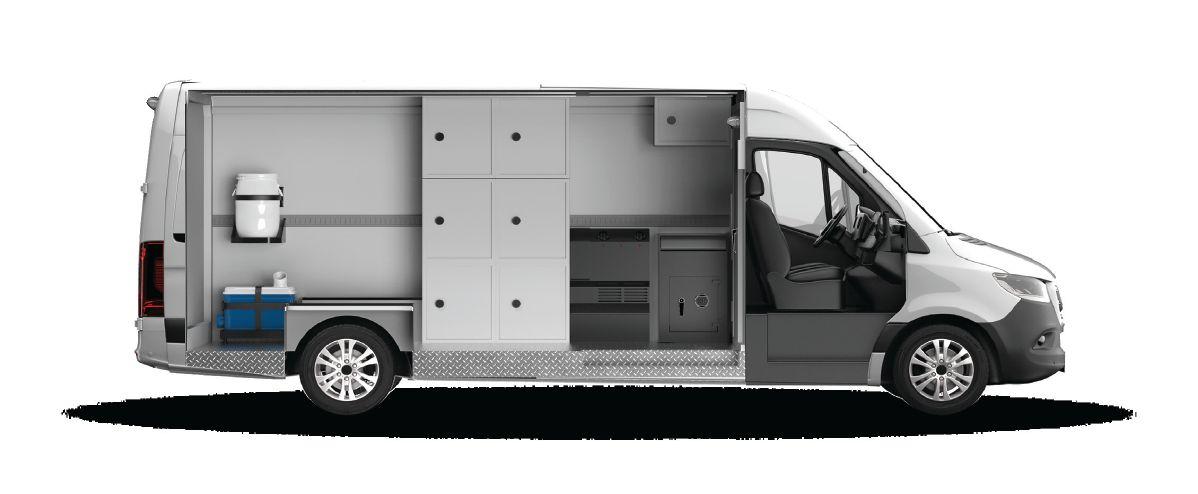







On January 22, Canadian Security hosted a roundtable discussion on cannabis security at its Toronto, Ont. Office.
The event was attended by security experts from the industry as well as vendors from companies that sell surveillance products to the industry. The purpose was to give the security experts in the cannabis market an opportunity to share their thoughts on the industry, talk about rules and logistical issues and exchange best practices. Over a period of two hours, participants discussed everything from the latest technology and procedures to processes and government regulations.
The event was moderated by Neil Sutton, editor, Canadian Security, and it marked the first time that a group of security professionals in the Canadian cannabis industry have sat in the same room to share best practices. Those in attendance, included:
• Paul Baziuk, senior account executive, Johnson Controls
• Ken Doige, vice president security, CannTrust
• Charles Ethier, security services director, GardaWorld
• David Hyde, security consultant and founder and CEO, Hyde Advisory
• Mike Jamieson, CEO, Raytec Systems
• Dave Scott, regional sales director – Ontario, Pivot3
• Brandon Smith, director, global infrastructure security, Canopy Growth Corp.
• Mike Soberal, senior director, corporate security, Aurora Cannabis
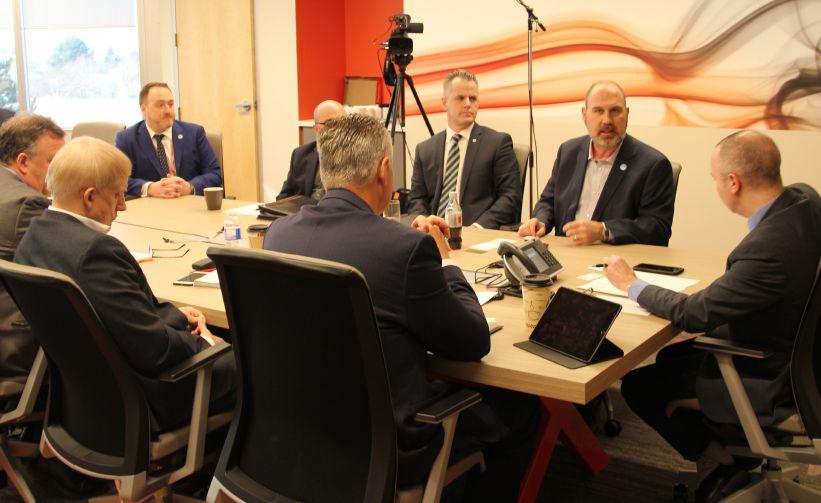
From the roundtable discussion, a number of common, security-related themes emerged:
• The industry has experienced growing pains, but “the sky didn’t fall” when recreational cannabis was legalized.
• There is a need to streamline rules and regulations across the country.
• Health Canada and the provinces should hold more consultations with the industry.
• Cannabis companies are spending huge amounts of money to comply with regulations.
• Canada is leading the way when it comes to the cannabis industry.
• The industry is heading in the right direction There was consensus among the professionals that some of the security regulations imposed on the cannabis industry, while understandable and to be expected when the industry was in its infancy, are too stringent, are inconsistent and offer being interpreted differently by regulators.
The room of cannabis security experts understand that cannabis is a regulated industry and there is a need for regulations, but that government set the rules based on information that was available at the time. Furthermore, there now needs to be more consistency across the board. They suggest that Health Canada officials meet with cannabis industry security professionals to establish solutions that make more sense for the ever-evolving market and licensed producers popping up across the country.
It was also pointed out that when it comes to transporting and shipping product, the canna-
bis industry often follows rules that are tougher and more restrictive than those imposed on the pharmaceutical industry which, in most instances, is transporting drugs that are inherently more dangerous.
Overall, the roundtable participants expressed a desire for more interaction with government and a desire to be consulted by Health Canada and provincial regulators on issues affecting the industry. They expressed a need to come up with solutions that are fair and will allow the industry to thrive Here are some questions that were addressed during the roundtable discussion:
What challenges has the industry faced since recreational cannabis became legal?
The security professionals indicated the industry has faced a number of headwinds since recreational cannabis became legal and, as a result there will be more consolidation in 2020. Consumer confidence has also waned somewhat due to lack of available product. Regulations, meanwhile, are interpreted and applied differently across the various provinces, regions and municipalities – and even from inspector to inspector.
Ken Doige, CannTrust, believes there are some real inconsistencies in the rules, but the industry deserves to be commended because while a lot of changes were introduced on the regulatory front the industry has complied and made sure that facilities are secure and that people working in them are reputable.


I’ve had the luck of working on this segment for about four years now. In the last year, we’ve seen significant growth and an influx of requests from customers as well as a positive response from customers that have a greater understanding of their security requirements.”
– Charles Ethier, GardaWorld

“I think first of all that the last year or so has shown that the boogeyman didn’t arrive when recreational cannabis became legal,” he told the roundtable, “and I think our culture, our society, our country is starting to understand that the sky didn’t fall and that crime hasn’t risen significantly as a result of it.”
David Hyde, Hyde Advisory, asserts there was a feeling that the industry would have been ready for the roll-out of recreational cannabis but there was a lot of regulatory change, so it was a relatively rocky start.
The supply chain didn’t open up in places like Ontario and B.C., he said, due to lack of stores, which caused challenges, and regulatory issues hit the news so investor and consumer confidence waned. Hyde expects a better year, but figures there’s going to be a lot of consolidation and distressed asset sales, as many of the mid-sized companies won’t make it.
In the early days, notes Dave Scott of Pivot3, everybody was just trying to build a facility, be in compliance and get their licence, so they weren’t as focused on their business model and, as a result, with those types of activities being the main goals, no one talked too much about business efficiencies. Consumers wanted product, but in the supply chain producers were having product turned back due to quality issues, he recalls. Retail stores had agreements with licensed producers, but they were unable to fill the orders.
For Charles Ethier, GardaWorld, the rollout of recreational cannabis put companies that provide security products and services under the gun because they had to deliver on multiple projects at the same time. There was a “rush to the gates” type of mentality in order to be compliant and security companies were under a lot of pressure to deliver systems that were operational in such a short amount of time, he said. Companies also had to juggle different vendors and suppliers and changing plans, he said, and had to make significant adjustments to be compliant while maintaining the highest level of security.
Mike Soberal, Aurora, said the industry is moving in the right direction but there are inconsistencies between regions, provinces, towns and even between different inspectors. In some instances, he’s had an inspector approve of work being done, only to have another one come in later and question the procedures. He suggests that Health Canada meet with security experts in the cannabis industry and work together to come up with regulations that are detailed, specific, clear and consistent and not open to interpretation. He would like to see the rules relaxed a little bit as cannabis is nothing like fentanyl or oxycontin.

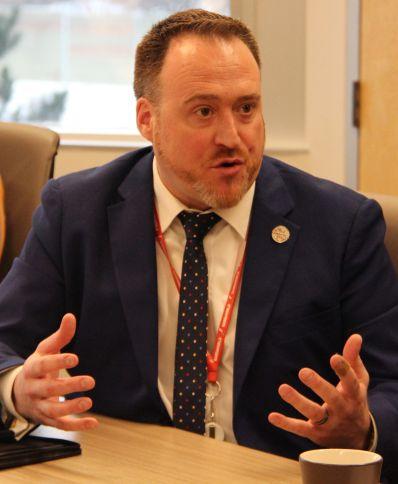
As for Paul Baziuk, Johnson Controls, he says it has been frustrating for cannabis retailers because they’ve spent a lot of money to comply with strict rules, some of which don’t make sense, and they’re interpreted differently.
“On the retail side,” Baziuk adds, “you have inspectors going in that will pass a location but another inspector will come in and say, ‘I want a camera in your hot water room.’ It just throws the end users for a loop. Why do you want a camera in a hot water tank room? But unfortunately their hands are tied. They have to put a camera in there.”
Mike Jamieson, Raytec, said there appears to be some improvement in how the regulations are interpreted.
“In the last year or so, we’ve really noticed that the designs we do are pretty much accepted now across Canada, with the exception of some weird thing like you need to have a camera in a place where you never had one before. Generally speaking, we’re seeing it be a little bit more consistent right across the board.”
For Brandon Smith, Canopy Growth Corp., one improvement has been the allowance of one security clearance holder per site. In the past, security clearances were needed for each licensed area or room. However, “just having one per facility has definitely done lots on our end,” he told the roundtable.
How have the changes been implemented?
The consensus among security professionals was that, in the beginning, many of the rules were too strict and interpreted differently. Now that recreational cannabis has been legal for
I think in the early days, it was all about compliance and how fast you could get there. People weren’t really looking at business needs, risk analysis and how resilient and what kind of fault tolerance their equipment could allow.”
– Dave Scott, Pivot3

Pivot3
some time, there’s a sense that the trend is going in the right direction, although there are still issues and participants felt it would be helpful for Health Canada to work more closely with the industry on the rules so it works for everyone.
According to cannabis security consultant David Hyde, oversight of the industry started out very heavy-handed, whereby, for example, the vaults used to store cannabis products resembled bank vaults or high-level narcotic vaults.
Over time, there have been some dispensations such as making the vaults into secure storage areas and reducing camera requirements within cultivating areas, he noted.
Growers had to blanket growing and vegetating areas and mother and clone rooms with cameras and motion detectors, but there has been some “right-sizing” and requirements were lessened to having cameras only at entry and exit points.
A good move by Health Canada was bringing an organizational security plan (OSP) into play to address personnel and procedures and security awareness training, although, he said, it still means different things to different people. The department is presently reviewing the situation and announcements are anticipated.
For Brandon Smith, Canopy Growth Corp., regulations governing video footage and how long tapes have to be stored are issues that still need to be addressed, but he echoed sentiments that regulations have come a long way. He said rules around OSPs have to be solidified so the industry can work towards that.
Mike Soberal, Aurora, indicated that regulation of the industry is trending in the right direction, but a requirement to keep video footage
for a year is overly excessive as the data takes up a lot of space on servers.
Another issue, he said, is that regulations state a producer has to have a head of security and alternate head of security but anyone can serve in those roles, even if they don’t have a security background. If someone is going to be named head of security, he said it only makes sense for them to have a security background.
How has the security industry adapted to regulation changes?
In the beginning, it was frustrating because the industry was in its infancy and in such a rush to get off the ground that they were just worried about getting the doors open and not so focused on the details.
Often, said Dave Scott, Pivot3, someone from within a group was appointed as head of security, which was frustrating to security services firms, because the individuals didn’t understand the advice they were being offered.
Mike Soberal, Aurora said Health Canada should have consulted with the security industry at the outset as professionals in the industry understand how to secure buildings and product and protect people.
While things are trending in the right direction, he believes the roll-out would have gone smoother had government recognized the expertise in security. Now, governments and the provinces need to listen to each other and the security and cannabis industry to bring normalization across the board, he said.
Ken Doige, CannTrust, agrees that a more collaborative approach is needed with Health Canada and other regulatory bodies, and even working with municipal governments with respect to permitting and licensing issues. He wants government and security professionals to look at harmonizing the various rules and regulations as they pertain particularly to provincial and federal legislation and regulations.
It can be confusing, he pointed out, because retail stores in Alberta need a secure storage room or vault which costs about $100,000 to build, while in Ontario sometimes it’s just a door or a pass-through window.
While attitudes are changing, Charles Ethier, GardaWorld, believes the challenge security professionals face these days is coming up with integrated systems that make sense, and work for the customers, the end-users and the industry in general, as opposed to just installing a system to comply with regulations.
According to Paul Baziuk, Johnson Controls, industry professionals have learned a lot and, in some aspects, could now teach Health Canada and inspectors about best practices and


In the last year or so, we’ve really noticed that the designs we do are pretty much accepted now across Canada, with the exception of some weird thing like you need to have a camera in a place where you never had one before. Generally speaking, we’re seeing it be a little bit more consistent right across the board.”
– Mike Jamieson, Raytec Systems

technologies to find efficiencies.
As an example, he now advises clients to move services to the cloud so professionals at a central station can handle things like video from security cameras, instead of a security guard or staff member.
What kind of security technologies are expected to be used in the future when it comes to cannabis-related facilities like LPs and retailers?
Security industry professionals indicated that there are plenty of technologies available to protect buildings and product, but Health Canada has to be more open to accepting new technologies that are proven to work.
Mike Jamieson, Raytec, said the security industry often takes its cue from what’s been successfully used in other fields like corrections and adopts the technology – and the cannabis industry is no different.
“At the end of the day, it’s a perimeter, it’s a building. It’s just different rules.”
One of the problems, though, said Mike Soberal, Aurora, is that regulations are based on securing a building and don’t account for securing the perimeter of a 400-acre parcel of land. He said technology such as ground sensors need to be considered so Health Canada must be open to that.
Biometrics for identifying personnel at a site are also readily accepted in the security industry but it is incumbent on Health Canada to be accepting of that as a security tool in the cannabis industry, he noted.
Soberal questioned why guidelines are not clear on, for example, whether and for how long a producer is required to keep video from a camera aimed at a vacant hallway. His interpretation is that the camera can be activated when there is motion but another person could interpret that it has to always be active.
What’s missing, said cannabis security consultant David Hyde, is the ability to take new and emerging approaches, technologically, that may be challenged a little bit in the literal interpretation of a regulatory prescription, and put it in a way that Health Canada will understand – and then sell them on it.
The people getting it right, he said, are the ones that find technology that works, then describe it in a way that Health Canada will understand because they are flexible if it fits with the regulatory prescriptions.
Dave Scott, Pivot3 said the industry should be aware that, in addition to taking up storage, the problem with technology like cameras is that they can go offline and a company could be non-compliant if it doesn’t have a backup plan. Often, companies don’t even know which cam-

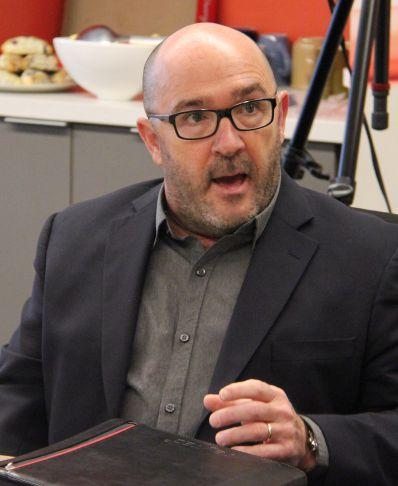
eras are connected to each unit, he noted.
The issue is complex and there are a lot of moving parts when it comes to storing data and ensuring systems are backed up, said Charles Ethier, GardaWorld, so it’s important for security to understand there are several elements – a drive, server-rack, server or camera system –that could fail or lead to non-compliance, so it all has to be integrated and operating as part of a complete security plan.
Paul Baziuk, Johnson Controls, said the cannabis industry has to be fair to government inspectors because for a long time “they’ve been drinking from a fire hose” and security professionals have been educating them along the way, and they’ve been agreeing to certain changes and passing the word around.
Ken Doige, CannTrust provided a word of warning, noting that producers and retailers in the cannabis industry must be wary of going for the lowest-cost fix because it often doesn’t get the job done. It’s more about finding strategic partnerships and right fit, he said, but also about “right-sizing the solution” perhaps via cloud storage, for example.
What are the challenges around the transportation of cannabis throughout the supply chain and to the market itself?
The rules around transportation are not consistent, according to security professionals. One participant said it’s a “dog’s breakfast” because there really are no established regulations around transport.
Brandon Smith, Canopy Growth, said his company has teamed up with Brink’s to handle
On the retail side, you have inspectors going in that will pass a location but another inspector will come in and say, ‘I want a camera in your hot water room.’ It just throws the end users for a loop. Why do you want a camera in a hot water tank room? But unfortunately their hands are tied. They have to put a camera in there.”
– Paul Baziuk, Johnson Controls
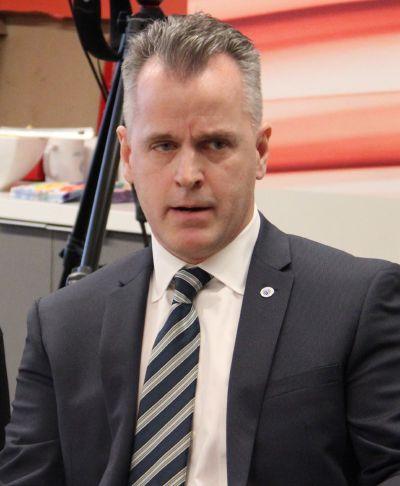
all of its national transportation needs and the arrangement has worked out well. He points out, though, that cannabis companies need to have the right national partner, one that has the ability to grow and expand with them.
With valuable shipments being sent across the country every day, Charles Ethier, GardaWorld said a problem with using transportation like armoured vehicles is that it substantially adds to the end-cost of the product so, in future, those in the cannabis industry might be wise to consider such technologies as tracking devices or GPS, or rely on security companies that specialize in tracking shipments.
Paul Baziuk, Johnson Controls, said transportation of product is an important issue and companies should be talking about it as there may be issues those in the industry are not aware of, one being that drivers are usually not trained in counter-surveillance techniques to ensure they’re not followed on a delivery.
While there really are no well-known regulations around transport of cannabis, security consultant David Hyde said that licensed producers are responsible when it’s being shipped to an end destination, so they do need to care. In his consulting practice, Hyde said he’s seen everything from do-it-yourself transportation to national contracts used by major players in the industry with a high level of organization.
A pressing issue, he said, is that product is often delivered on a just-in-time basis so cannabis companies routinely have to call a carrier to get it off their dock quickly, while another concern is that contractors are routinely subcontracting their hauls to other companies and there’s often no record of that.
He maintains there is a need for a more unified approach and noted that incidents of cargo thefts, in general, are increasing so cannabis companies must benchmark their security against what’s happening.
Mike Soberal, Aurora also spoke about the need for clearer rules around transportation. As an example, he noticed that one day on his loading dock there was a crate full of pre-packaged medical marijuana set to be picked up by Canada Post and shipped to customers, and just five minutes later, a similar shipment of product was being shipped from the dock to another of the company’s facilities via armoured car.
For Ken Doige, CannTrust, the Achilles heel of seed-to-sale for cannabis is the transport, as they can be hijacked. However, he warned against going overboard and suggested that security professionals in the cannabis industry work with government to look at best practices that can be established before the hammer comes down.
What security challenges do cannabis retailers face and how are they being addressed?
Security professionals in the cannabis industry often must deal with different rules, depending on the municipality or province. The consensus of the roundtable was that the provinces need to meet and consult with security experts in the cannabis industry and set standards that make sense across the board.
It is literally down to individual municipalities to regulate cannabis sales and it would be more helpful if the provinces sat down and come up with standardized security requirements for retailers, explained Mike Soberal, Aurora. “That foundation needs to be set first” in consultation with the industry and then come up with a plan that’s reasonable for the stores. There’s a great opportunity there to sit down with the major retailers and come up with a base foundation and then build off of that.”
A prime example of a rule that makes no sense from a security perspective is in Alberta where retail stores that sell cannabis are required to have coverings on windows which essentially prevent police and others from seeing into the stores, creating a perfect screen for thieves, said Ken Doige, CannTrust.
“They have all kinds of time to fill their bags and pockets, injure employees. This is a disaster waiting to happen.”
Paul Baziuk, Johnson Controls told the roundtable that a robbery occurred in Edmonton recently. The windows of the store were smoked glass. Thieves cased out the store, subdued the clerk and stole goods.


I think first of all that the last year or so has shown that the boogeyman didn’t arrive when recreational cannabis became legal, and I think our culture, our society, our country is starting to understand that the sky didn’t fall and that crime hasn’t risen significantly as a result of it.”
– Ken Doige, CannTrust


According to cannabis security consultant David Hyde, in the beginning many retailers were in a rush to get their outlets open and only did the bare minimum that was necessary and didn’t take consequences into account.
Stores need to address exposure points such as when employees are leaving work or taking out the garbage, he said. Meanwhile, in plazas thieves often break-in through a roof or nextdoor unit so security regulations should be geared to address that, but that’s a “glaring hole” that’s often neglected.
The bottom line, said Dave Scott of Pivot3, is that the level of security often boils down to the value of the product being protected and many retailers won’t think about better systems until something happens.
Does the introduction of edibles pose a new security challenge?
The introduction of edibles does not pose much of an additional security challenge, according to most of the experts at the roundtable. There were some concerns expressed, however, that companies that make edibles might have to look at added security measures where some preparation activities are taking place.
Mike Jamieson, Raytec, said, as with any food, product tampering can be an issue. In the last six-month period, Raytec has been asked to provide a lot of quotes for more lighting in assembly areas and around machines.
Cannabis security consultant David Hyde said there may be some security issues due to the fact edibles have resulted in more people being brought into facilities who have consumer goods packaging expertise, so there’s a security issue there and it also must be determined who is responsible for overseeing that.
Health Canada is trying to figure out how to deal with rooms where cannabis 2.0 activities like

mixing are taking place, he said, and may want a higher level of security so that might be an issue down the road.
From a production perspective, edibles may add complexity to the manufacturing process, but apart from adding a few more cameras along the processing lines it doesn’t seem like a big security concern, said Mike Soberal, Aurora, as edibles are just another SKU in the product line and transportation of product will be no different than what’s in place now.
Brandon Smith, Canopy Growth, said a facility that makes and stores edibles will need a licensed secure storage area because the product is left behind, and also when dealing with beverage lines and mixing tanks companies will have to account for blind spots so coverage becomes more challenging.
and concerns?
Cybersecurity and information security is one of most challenging aspects of security right now, not just in the cannabis industry but across the board, according to those at the roundtable. The professionals feel there needs to be clearer regulations around the security of data and information, especially when it comes to storing video footage that is collected and stored on networks by cannabis companies.
Mike Soberal, Aurora, said there are standards and regulations in place to address medical data kept by companies, but Health Canada has left a “glaring hole” when it comes to regulations around customer information that is kept on the networks of companies in Canada. While there are guidelines, he said there is no regulatory body that dictates how corporations must regulate their networks.
Cannabis Security consultant David Hyde, believes an often overlooked point is that there is
$10.30
Average price of legal cannabis between October and December 2019; an increase from $9.69 per gram the year before.
$5.73
Average price of illegal cannabis per gram in that same fourth quarter; up from $6.44 per gram a year earlier
$7.88
Cost per gram for legal cannabis in Quebec; the lowest in Canada $6.21 and $4.90 Cost per gram in Ontario and New Brunswick, respectively, for illegal cannabis - the highest and lowest costs by province in Canada
400
Cannabis retail stores in Canada
5% of Canadians live within 10 km of a cannabis store.
Source: Statistics Canada
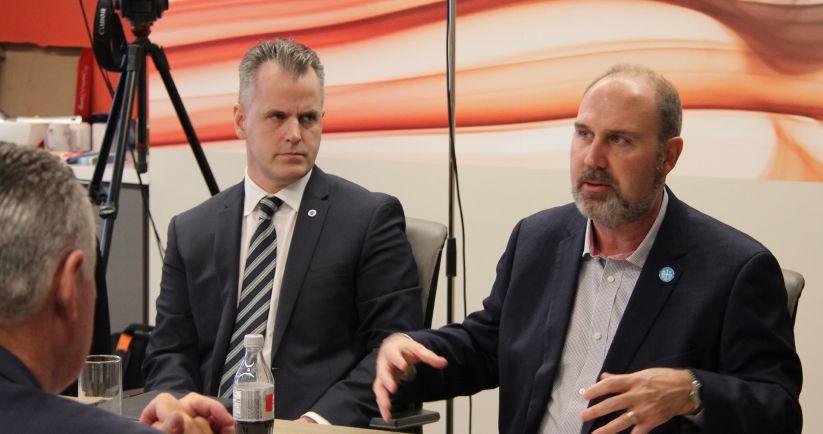
privacy legislation in Canada (PIPEDA) that outlines what companies are required to do if they experience a data breach that touches on private information, but he doubt that cannabis companies have their heads entirely around the issue.
The other issue is the question of what is personal information, he said, because video of an employee might be so the issue is how companies are safeguarding such video footage. Cannabis companies, he said, must do a risk assessment to determine what’s regulated and what’s just good business, but “I don’t see a lot of licensed producers taking a very mature approach to IT and cyberrisk management at this point.”
Ken Doige, CannTrust, said the company has taken a number of steps to secure its network, including having dedicated fibre lines to facilities that are pushing access control video to the cloud.
It’s a matter of business resiliency and continuity as to how a business secures its information network and its important for companies to work with their IT team to ensure everything is buttoned down, he said.
Paul Baziuk, Johnson Controls, said it’s important for those who work in the cannabis industry to be aware that allowing employees to plug electronic devices that are not secure into a company network could result in real problems, as the device could communicate or stream information to outside sources. He suggested companies do more diligence on the product or company that manufactures a device.
The traditional thinking was that security threats were going to come though a gate or door, but that has been turned on its head, noted Dave Scott, Pivot3, and now the threat is coming from a remote location where hackers get access to a network cable or camera system through a port and steal information.
Cybersecurity and information security is definitely one of most challenging aspects of se-
curity right now, said Brandon Smith, Canopy Growth, But at the end of the day it’s about protecting the end-points of a business operation. As a result, Canopy Growth does a lot of staff training and tests staff with phishing emails. Staff also go through training every three months to get recertified to use their email.
How does the cannabis experience in Canada compare to what is happening in the U.S.? Canada has led the way in the cannabis industry and other countries can learn from the experiences here, the security professionals said.
Mike Soberal, Aurora, said Canada rolled out the industry in the right way with federal regulations which established a baseline, but the challenge now is to get regulations streamlined across the country.
In the U.S., regulations are state by state and county by county, which causes problems, he said. In Las Vegas, for example, there may be five different interpretations of whether a fence is needed around an operation.
Brandon Smith, Canopy Growth, said it’s a challenge when building out stores in the U.S. because regulations are so different in each state. There is also the added challenge of trying to figure out what the rules might be if the federal government takes over.
For Mike Jamieson, Raytec, it’s been much easier to work in Canada’s industry although there are still issues. He noted that the licensing process is very expensive in the U.S. and the approvals process is difficult.
The perspective of Charles Ethier, GardaWorld is that Canada is leading the way, but the security industry should collaborate and share experiences and knowledge in order to still improve the situation here.
Paul Baziuk, Johnson Controls gave an ex-


David Hyde, Hyde Advisory, believes licensed producers are responsible for the cannabis when it’s being shipped to an end destination, so they do need to care. In his consulting practice, Hyde said he’s seen everything from do-it-yourself transportation to national contracts used by major players in the industry with a high level of organization.

ample of the difference in the mindset between Canada and the U.S. He said it’s still difficult for Canadian executives and security professionals who work in the industry to travel to the U.S. and there have been instances where such professionals have been refused entry.
Security consultant David Hyde said that when he talks to industry professionals in other countries, he lets them know Canada did some things quite well, but also went down the wrong road on some issues. In spite of that, however, Canada is in a very unique place to export its expertise to the world, he said.
Ken Doige, CannTrust, said his perception is that it’s going to be difficult to change the rules in the U.S. now that the states have legislated the industry.
“They’re trying to build the boat while they sail it,” he said.
Legalization of recreational cannabis has gone relatively smoothly and Canada should be com-
Sponsored by
mended for establishing a baseline of regulations. The roll-out of cannabis hasn’t turned into the Wild West, as some feared it would, with a spike in cases of impaired driving and psych wards filled with patients stricken by reefermadness. Health Canada deserves a lot of credit for managing the roll-out effectively.
As with any new industry, though, the cannabis sector has faced growing pains. The main concern is that regulations governing the industry are different from province to province. There are inconsistencies with the regulations and they are very broad and open to interpretation. Regulations can be interpreted one way in Nova Scotia and another way in British Columbia. There is room for improvement.
As the industry has matured, there has been some right-sizing of the security requirements but more needs to be done.
Security professionals in the cannabis industry are suggesting that a meeting be arranged with representatives of Health Canada so they can put forward their case for relaxing some of the rules.




MIKE JAMIESON CEO, Raytec Systems Inc.

www.rayteccctv.com
Q: What do you bring to the cannabis market?
A: What we bring to the cannabis market in Canada is an expertise in lighting for security and safety. We consider ourselves to be subject matter experts in security lightning in this vertical market. In the cannabis growing industry, perimeter lighting and interior lighting is very important. There are a lot of myths out there that infrared lighting affects the growing cycle and physiology of plants, which it doesn’t. We have letters from university professors that we can share with our customers that dispel these myths.
Q: Have you managed to solve any unique challenges to the cannabis market?
A: Specific to cannabis, I would say a lot of it is, “How can we do this for the least amount of money?” There are also some beliefs that cameras with built-in illuminators will solve all the problems. They are very good for short distances, but especially outdoors or in the larger parts of the growing facility, they’re just not as adequate as they should be.
Q: What opportunities does the cannabis market present for your company?
A: We have been involved in it from the very, very beginning, so even when it was medical there were still requirements for security lightning. What we’ve noticed now is the fact that, as it’s progressed over

the last few years, it has become more standard. The inspectors have a better understanding of what’s expected, so we’re seeing it to be much easier to do a design around the regulations.
Q: How are you working with integrators?
A: If they’re an integrator that is brand new to the cannabis industry, then we realize we need to start right from the beginning to explain that there are regulations that can’t be taken as literally as they sound because they are too ambiguous. If they go by the basics of the regulations then their license will be rejected, and they will have to do some lastminute changes. What we do is show them designs going back years because what we do is a full design. In the regulation, it says “adequate lighting” but, for us, adequate lighting is basically a 10-page 2D and 3D lighting design that shows all the levels of illumination.
We’ll show them this is what gets accepted and this is what doesn’t get accepted and you have this opportunity now to do it or don’t do it. Generally, if they are new to it they’ll do it. We’ve done projects with integrators before on multiple sites and provinces and we’ve learned from the mistakes made and can pass on that experience to them.
Q: Has it been a learning process as this product has got up and running?
A: Absolutely. In Canada, it’s been fairly straightforward. At the very beginning, if the licence didn’t get accepted, we would have to add additional lamps and cameras. It was just really mechanical. In the USA, and now in Columbia and Mexico, we’re finding it really is completely up to the individual putting together the specification to hope that they pass. So, we’ll take what we learned here, we’ll bring it to them, but they don’t always accept it and then, again, it’s a last- minute shipping of equipment to get their licence.
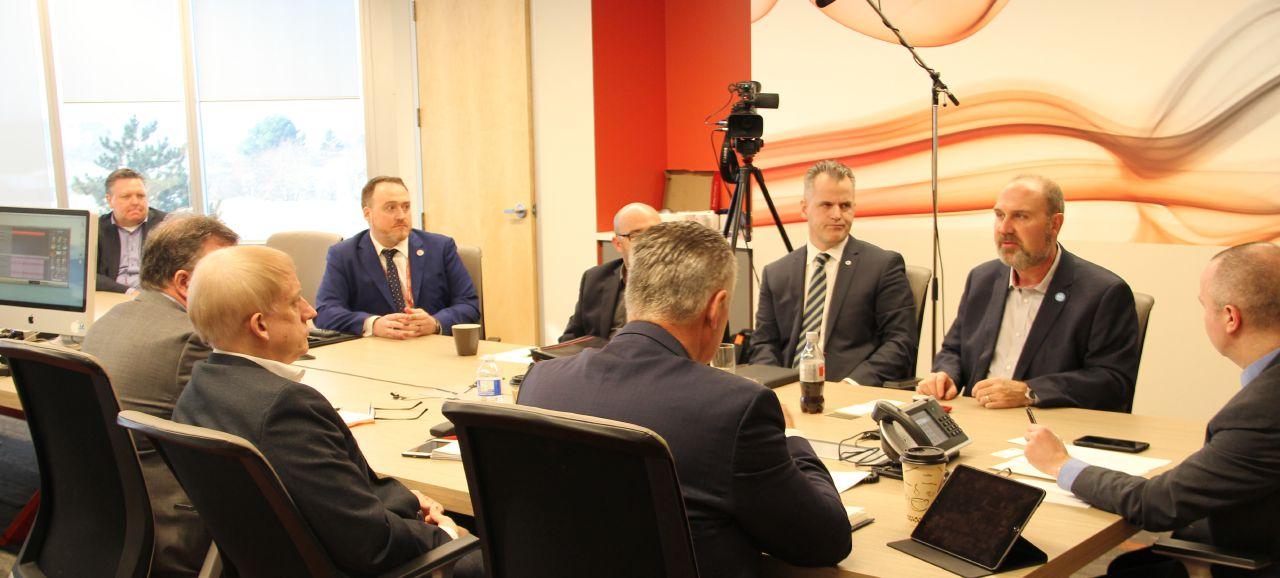



DAVE SCOTT regional sales director, Ontario, Pivot3

www. pivot3.com
Q: How does Pivot3’s security solutions help cannabisrelated companies?
A: Pivot3 is a software defined storage company. We take our software and apply it to Dell or Lenovo platforms X86 off the shelf hardware. What it allows us to do is offer a video backbone or ecosystem for any clients facilities so they can house their own video and scale it as required. We are also able to tolerate losses of servers and harddrives in a more risk adverse way than traditional NVRs”
With this we also have the ability to bring on other mission critical or business critical applications, so clients end up with one platform as opposed to having all these siloed servers to run various applications. This allows them to handle faults more easily without disrupting their compliance with Health Canada, which can ultimately lead to being shut down.
Q: What are some of the security challenges facing the cannabis industry?
A: I think in the early days, it was all about compliance and how fast you could get there. People weren’t really looking at business needs, risk analysis and how resilient and what kind of fault tolerance their
equipment could allow. Now that these LPs are up and running they’re looking at refreshes and higher cost. Overall we’re seeing the industry get into a more efficiency model where they can’t do what they did initially. They have to tighten up and they’ve started to look at migrating all their platforms on to one set of hardware to really bring down the price per gram to really be something that they can be profitable at. I think successful operations have started to look at the resiliency and their risk tolerance as a whole. LPs are realizing that they’ve got a lot of siloed applications that they’ve got to bring together. And, they’re starting to look at migrating to the cloud, although communication infrastructure is a problem for a lot of rural properties. They are also looking at how tolerant and how risk adverse they are if they start to lose things like power or video as far as staying in compliance with Health Canada. So, they’re starting to look a little harder at their systems as more and more facilities are beginning to get knocked or shut down for non-compliance.
Q: What does the future hold for LPs looking at improving their security posture?
A: Everyone’s always questioned the requirement for keeping video for, initially two years and now one year. What we’re seeing, as we get into edibles and as we kind of go for more efficiency models, we are starting to see video used for business needs. Everyone’s kind of anticipating that the one storage rule may get relaxed, but there’s nothing really to base that on at this point. The one-year video retention seems very strong because, even after the reduction of two years to one, cannabis companies are still effectively running data centres – or they’re confused how to migrate it to the cloud.
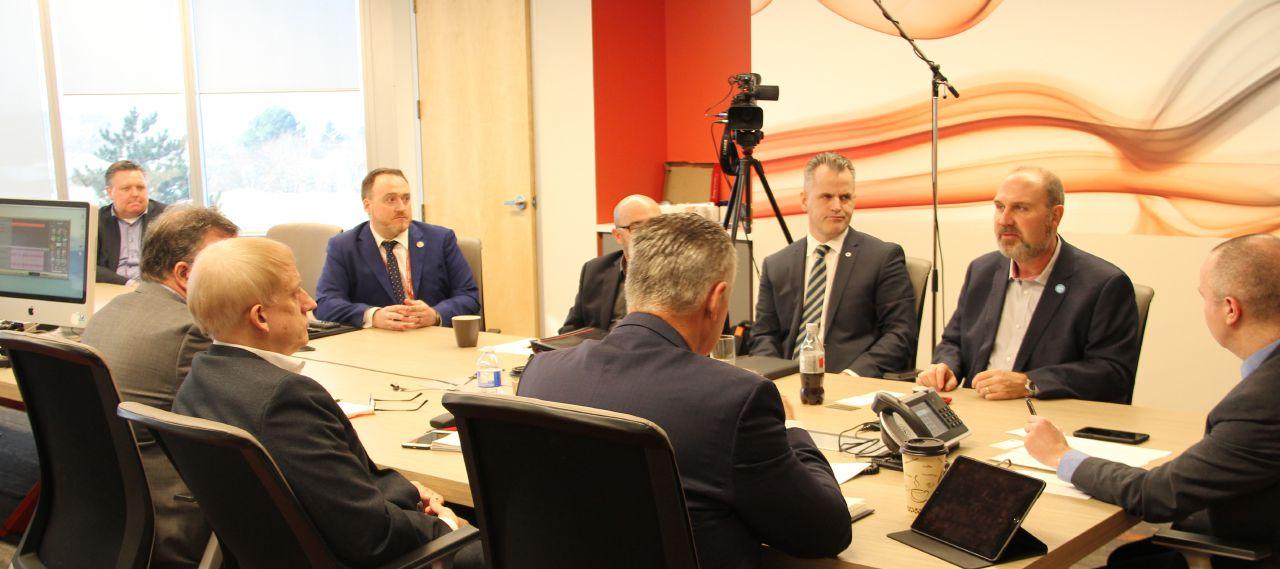




CHARLES ETHIER Director, Major Accounts, Security Systems, GardaWorld
www.garda.com
Q: What services does GardaWorld offer the cannabis market?
A: GardaWorld is well-positioned as being the only purely private security company that can provide services for the whole supply chain from bringing in clones all the way up to transporting the finished product and consumable products for transportation to 3 PLs (third-party logistics companies), as well as to extraction facilities and ultimately to the retail sites as well. Our services are tailored to the customer's need as well as the producer's and extractor's. We have physical security, staffing, transportation, guarding which is one of our big segments, and newly added to the family is the electronical security division. We have an open mind and provide complex, integrated system solutions for cannabiscompliant licenses.
Q: How have you seen the cannabis security market grow over the past 12-18 months?
A: I've had the luck of working on this segment for about four years now. In the last year, we've seen significant growth and an influx of requests from customers as well as a positive response from

customers that have a greater understanding of their security requirements. So, we did see almost a 200-per-cent spike in the electronical security divisions. We noticed some significant improvement in all market shares.
Q: What specific pain-points are you hearing about from clients in the cannabis market, including licensed producers?
A: We are kind of stuck in-between the consultant and the end-user – being the licensee or the application licensees – and we try and provide as complex and as flexible solutions while trying to keep the cost down to a minimum. The budget streams and the cash flow has somewhat dried up in the last couple of months and we've seen that, over the course of the process, the license applications are quite long so they do have to operate without any revenues for 18 to 24, even 36 months sometimes. Physical security obviously has a very big impact on the budget whether it is operational or capitalization. That is, in a sense, the pain point that we struggle with because customers don't want to spend money but they want the best for it while thinking of just meeting the minimum requirements. So, it's a complex challenge for us to struggle with.
Q: What are the future opportunities for Canada’s cannabis sector?
A: I'm 41 years old, but never have I seen a new business boom from the start and to be able to literally grow, pun intended, that vertical up to a standard where other countries and government regulators are looking to see what we do, what we don't do good, what we do best, and what we can do to improve this sector which, I think, will be flourishing for the years to come.
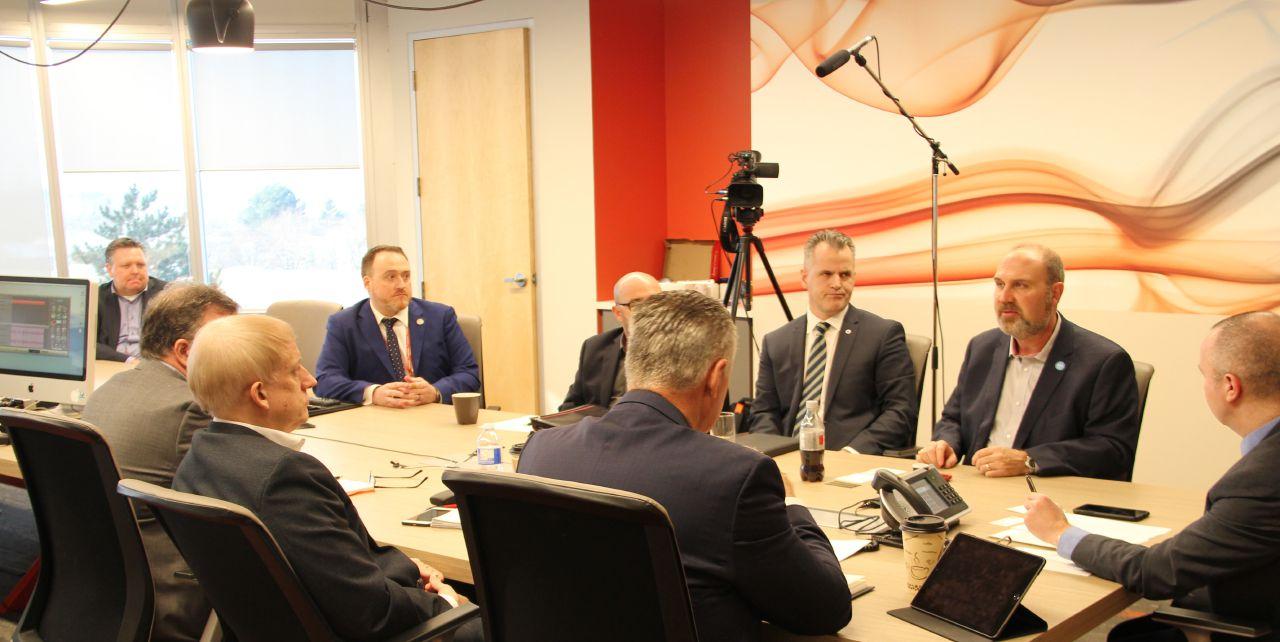



PAUL BAZIUK senior account executive, Johnson Controls
Q: What types of solutions does Johnson Controls provide to the cannabis market in Canada?
A: We are an experienced, full-service provider and integrator of fire, security, HVAC and building automation products. Our footprint is global, but in Canada it is from coast to coast. We have many resources in every province to supply, install and program each of those systems, whether it’s fire, security, HVAC or building automation. Within our company we have a lot of resources that have great experience with many products. We can be transparent with a client on what works and what doesn’t work for their solution.
Q: How are you helping cannabis facilities and retailers with the challenges they face today?
A: We sit down with them to discuss the design of the system. We get their input and find out which products they like to use because it’s really important for the end-user to be comfortable with the product. Otherwise, they’re going to hate it and they won’t use it or they’ll wind up replacing it. We

do the installation, the service, the programming, and lastly, we manage the services so we take some of the responsibilities off of them and we do it in-house. This allows companies to focus on their core business, which is selling and delivering cannabis products in Canada. Some of the other services we do for them are the administration on the access system, making sure the video system is working, that there’s no video loss, and giving them an audit report of all of those systems on a weekly or monthly basis.
Q: What is the scope of the market for security advisors?
A: There’s huge opportunity because some of the big clients have a national footprint so it’s important for to them to have a service provider in each of their markets that has the ability to respond quickly. It’s very important. These clients cannot wait five days or 10 days for a service technician. It pretty much has to be the next day or the same day. So, there are huge opportunities for security integrators that are in this market to grow.
Q: Are there any lessons to be learned from the short time that recreational cannabis has been legal?
A: Yes, communication is key. You have to be dedicated. You have to have a team internally and also a team on the client side where the players are well known. You almost become like a family where you’re communicating with them by phone, by email, by text message, on a daily or hourly basis. So, it’s important that the players on each side are dedicated and staying in communication.
